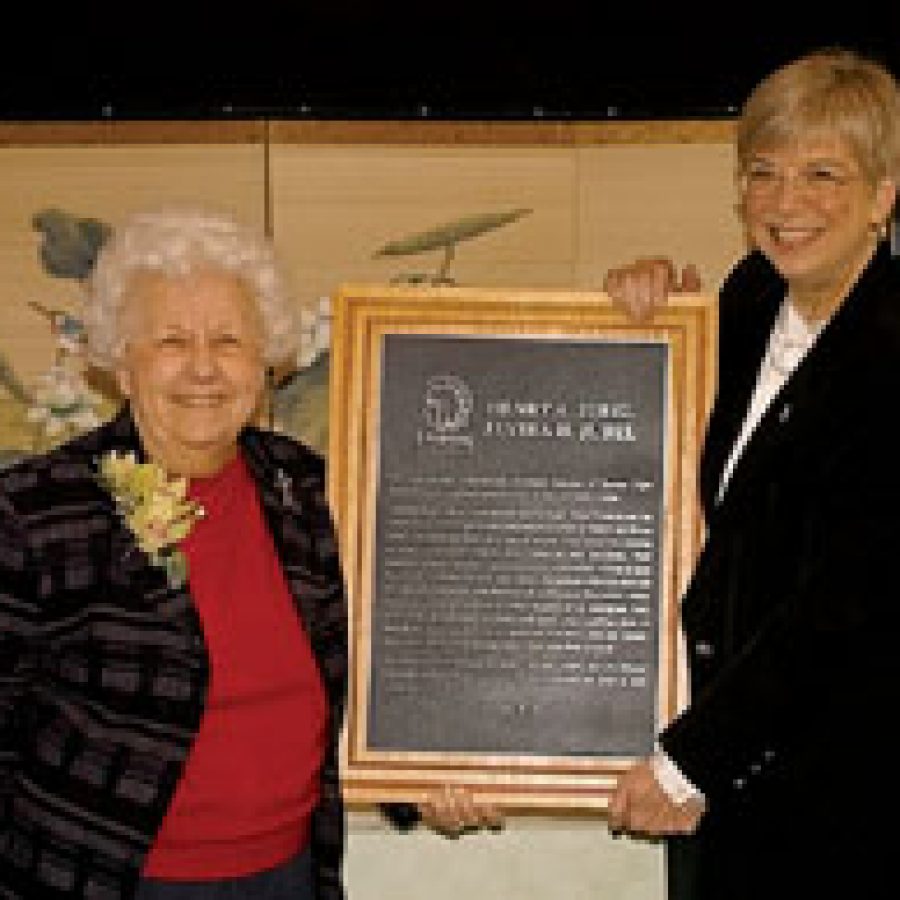Members of the Henry and Elvira Jubel family recently were honored at Lutheran High School South for their gift to the capital fund of the Lutheran High School Association, according to a news release.
The Jubel family of south county was recognized during Lutheran South’s fourth “Legacy of Thanks” worship service.
Henry Jubel, founder of Spartan Light Metal Products in Sparta, Ill., and his family have had a long history of support for Lutheran South and a number of Mr. and Mrs. Jubel’s children and grandchildren are graduates.
Henry Jubel died several years ago, but his wife Elvira, their children Donald, Christine (Homan), and Darren as well as a number of their children attended the service.
Spartan Light Metal Products has made a very significant leadership gift to the capital campaign. Lutheran South’s library is now named in the Jubels’ honor.
Henry Jubel was born in a small village in Eastern Germany in 1918. His father, Richard, was a master mechanic in machinery construction and worked as a “monteur,” a person who sets up machinery, in factories that made fancy lace.
Richard Jubel emigrated to the United States in 1927, sponsored by a cousin who was living in St. Louis. When Richard Jubel arrived here, he could not speak English and wasn’t familiar with the machinery, so he took a janitor position in a tool and die shop. At night he attended Hadley Trade School and took English courses.
For three years, his wife, Elsa, stayed in Germany and supported the children by making clothes. When Richard Jubel had earned enough money for third-class tickets on a passenger ship, Elsa, Henry, and his brother Helmut made the nine-day trip across the Atlantic Ocean and disembarked at Ellis Island for immigration processing.
After a train ride from New York to St. Louis, the family of four settled into an apartment on Oregon Street in south St. Louis. Henry and Helmut began their schooling at Emmaus Lutheran School on South Jefferson because they had belonged to the Lutheran church in Germany.
Though there was a period of adjustment, Henry Jubel learned to speak English within a month and did well in school, especially arithmetic.
By the time Henry Jubel was a junior in school, the superintendent of the Bayless School District recommended him as a candidate for an academic scholarship to Washington University. In June 1936, he was granted the Guth Scholarship that paid full tuition to Washington University.
In the spring of 1940, he graduated from Washington University and met his future bride, Elvira Recker, whose father also was a German immigrant.
In 1941 the National Defense Act had been put into effect and he took a position with the Civil Service Department, gearing up for the possibility of war. While working for the Civil Service Department, Jubel received the highest civilian award and a cash bonus of $1,000 for the invention of a grenade launcher design.
From the time that he took a metallurgy course in college, he had been interested in foundry work, so after the war in 1945, he went to work for Sterling Aluminum Products as a production engineer.
In 1948, Henry and Elvira Jubel were married at Messiah Lutheran Church. The Jubels were blessed with three children — Christine, Donald, and Darren — and the 1950s were good years.
When Sterling underwent a management change in 1959 Jubel found himself at odds with management because of differing philosophies over labor. Realizing he could not stay in the situation, Jubel decided that his best work prospect was to start his own foundry business and manufacture a product. Elvira supported her husband without hesitation.
Jubel was interested in aluminum die casting and Sterling wanted to get out of that business. Because he had not burned his bridges at Sterling, Jubel was able to negotiate the purchase of Sterling’s aluminum die-casting machines and had two solid customers lined up before he started.
That was the beginning of Spartan Light Metal Products. Today, Spartan has annual sales of $138 million and is perceived in the industry as the value leader in light-metal technologies because of innovative engineering solutions and competitive costs, the release stated.
Jubel received many awards for his innovative accomplishments and empowering management style before he died in 1999.
The Jubel family continues to manage Spartan and continues to focus on the Christian values upon which the company was founded: to succeed by being honest and working with integrity; to act responsibly and be accountable for quality work; to be helpful and cooperative with everyone; and to take pride in the company.
Jubel developed some of his lifelong philosophies of management early in his work career. He believed that a one-on-one relationship with workers was imperative and that the most important quality for going into business successfully was perseverance.
He said, according to the release, “It makes you do the things that have to be done.”
















